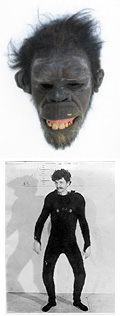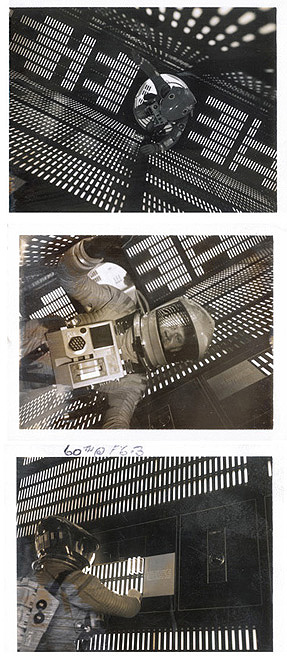[Original works from the Stanley Kubrick Estate.
Stanley Kubrick and Geoffrey Unsworth developed a system for calculating from the grey tones of b/w Polaroids the right lighting for filming
2001: A SPACE ODYSSEY.]
Update
¬ Subscribe Newsletter
Newsletter No. 1, November 2003
Dear colleagues and friends,
This is the first issue of our monthly newsletter, which reports about our
current work on the Stanley Kubrick estate and the exhibition starting in
March 2004. We will inform you about coming events, present a variety of
selected objects and publish statements by people who are associated with
Stanley Kubrick's life and work.
Please click
¬ here to subscribe or unsubscribe
1. Work in Progress
Our archivist Bernd Eichhorn continues working at full stretch to survey a
vast amount of photographs, costumes, props and technical equipment. He has
been living at Kubrick's house in St. Albans for half a year now and systematically
captures the estate in a database. In only a few weeks material from the estate will
be shipped to Frankfurt where the exhibits will finally be selected. Only a small
part of the immense stock can be presented to the public, even though the Deutsches
Filmmuseum and the Deutsches Architektur Museum together provide an exhibition space
of 1,200 square meters. Nevertheless, the exhibition will provide new insights for
fans and researchers alike. It will shed light on Kubrick's technical approaches to
film as well as on influences from architecture and design.
Work on the extensive exhibition catalogue is in progress. It will feature single
films by Kubrick and present comprehensive essays on his work. Thomas Elssaesser
writes about A CLOCKWORK ORANGE, Georg Seeßlen about FULL METAL JACKET. Wilhelm
Roth examines the quarrels about censoring PATHS OF GLORY, Winfried Günther the ones
about SPARTACUS. Alexandra von Stosch pays tribute to Kubrick's early photographs for
Look, Ursula von Keitz scrutinizes the different script versions for THE SHINING and
Marli Feldvoß looks at Kubrick's films from the gender-perspective. Bernd Schultheis
(who also provides a concert event accompanying the exhibition) analyzes the Kubrick-soundtracks,
Volker Fischer studies the future design for 2001 – A SPACE ODYSSEY and Daniel Kothenschulte
gives insights into a pie fight sequence, which was eliminated from
DR. STRANGELOVE OR: HOW I LEARNED TO STOP WORRYING AND LOVE THE BOMB. The catalogue also
includes essays on the films that were never realized: Eva-Maria Magel
reconstructs Kubrick's extensive work on
Napoleon; Ronny Loewy researches
the Holocaust-project
Aryan Papers. Some of the authors contributing to the
catalogue will lecture at a Symposium that is scheduled for Mai 2004.
2. This Month's Object

One of the ape-costumes from the opening sequence of 2001 – A SPACE ODYSSEY
will be restored especially for the exhibition. The mime Dan Richter wore
this costume as the moonwatcher in this sequence entitled "The Dawn of Man".
Richter was engaged by Stanley Kubrick to choreograph the movement of the apes
and to play the most important one of the animals himself. The then unknown artist,
who later worked with celebrated artists such as John Lennon and Yoko Ono, became
part of film history for throwing a bone: the scene applied the probably most quoted
match cut of all times. An excerpt from the recently published "Moonwatcher's Memoirs"
will be reprinted in the catalogue. Richter describes his preparations for "The Dawn of Man"
that included intensive studies of primates in zoos. He developed the choreography in
close collaboration with the make-up artist Stuart Freeborn whose work was equally
outstanding: 2001 – A SPACE ODYSSEY only did not receive an Oscar, Arthur C. Clarke
stated once, because the jury had not realized that there were not actually apes
performing for the film.
3. Celebrity Statement

After greetings by
¬ Nicole Kidman and
¬ Tom Cruise,
¬ Sydney Pollack,
¬ Steven Spielberg and
¬ Warner Bros., the key holder of the copyrights,
a letter by
¬ Sir Arthur C. Clarke
has arrived. Clarke and Kubrick collaborated long and
intensively on the script for 2001 – A SPACE ODYSSEY, for which they received the Academy
Award. The script was based on a short story entitled
The Sentinel that Clarke turned
into a novel-length book while the film was being produced. Arthur C. Clarke ranks with
the most successful science-fiction authors of the last decades. He wrote approximately
30 novels, a large number of short stories and numerous non-fiction books. When he was
working as a radar specialist for the Royal Air Force, the studied mathematician and
physicist submitted a study which made him the "father of satellite communication". The
UNESCO awarded Clarke with the Kalinga-Price for his popular scientific work in 1962.
The eighty-six year-old, who has been living in Sri Lanka over the last years, is still
working and publishing in the areas of space research and oceanography which he has
discovered to be the other one of his passions.
For more information on Arthur C. Clarke see:
¬ http://www.kirjasto.sci.fi/aclarke.htm
¬ http://www.clarkeinstitute.com/
¬ http://www.arthur-c-clarke.de/
4. Miscellaneous
The documentary SCHATTEN UND LICHT – KEN ADAM, FILMARCHITEKT
(Directors: Andreas Michael Velten und Jörg Plenio) was recently broadcasted on
German television and can soon be seen again. The legendary production designer,
who was already honored with an exhibition at the Deutsches Filmmuseum, has created
the architecture characteristic for classical Bond films and many set designs for
Kubrick, as for example the famous
war Room in DR. STRANGELOVE OR: HOW I LEARNED
TO STOP WORRYING AND LOVE THE BOMB. For the Kubrick exhibition the “War Room” will
be reconstructed as a model in collaboration with Adam.
This Month’s Website:
¬ http://www.visual-memory.co.uk/amk/
On the "Kubrick Site", you can find many essays and detailed discussion about issues and questions on Kubrick.
It belongs to a general site that also features a special on 2001 – A SPACE ODYSSEY,
answers FAQs on Kubrick and certainly provides standards such as biography and filmography.
¬ drucken


 One of the ape-costumes from the opening sequence of 2001 – A SPACE ODYSSEY
will be restored especially for the exhibition. The mime Dan Richter wore
this costume as the moonwatcher in this sequence entitled "The Dawn of Man".
Richter was engaged by Stanley Kubrick to choreograph the movement of the apes
and to play the most important one of the animals himself. The then unknown artist,
who later worked with celebrated artists such as John Lennon and Yoko Ono, became
part of film history for throwing a bone: the scene applied the probably most quoted
match cut of all times. An excerpt from the recently published "Moonwatcher's Memoirs"
will be reprinted in the catalogue. Richter describes his preparations for "The Dawn of Man"
that included intensive studies of primates in zoos. He developed the choreography in
close collaboration with the make-up artist Stuart Freeborn whose work was equally
outstanding: 2001 – A SPACE ODYSSEY only did not receive an Oscar, Arthur C. Clarke
stated once, because the jury had not realized that there were not actually apes
performing for the film.
One of the ape-costumes from the opening sequence of 2001 – A SPACE ODYSSEY
will be restored especially for the exhibition. The mime Dan Richter wore
this costume as the moonwatcher in this sequence entitled "The Dawn of Man".
Richter was engaged by Stanley Kubrick to choreograph the movement of the apes
and to play the most important one of the animals himself. The then unknown artist,
who later worked with celebrated artists such as John Lennon and Yoko Ono, became
part of film history for throwing a bone: the scene applied the probably most quoted
match cut of all times. An excerpt from the recently published "Moonwatcher's Memoirs"
will be reprinted in the catalogue. Richter describes his preparations for "The Dawn of Man"
that included intensive studies of primates in zoos. He developed the choreography in
close collaboration with the make-up artist Stuart Freeborn whose work was equally
outstanding: 2001 – A SPACE ODYSSEY only did not receive an Oscar, Arthur C. Clarke
stated once, because the jury had not realized that there were not actually apes
performing for the film. After greetings by
¬ Nicole Kidman and
¬ Tom Cruise,
¬ Sydney Pollack,
¬ Steven Spielberg and
¬ Warner Bros., the key holder of the copyrights,
a letter by
¬ Sir Arthur C. Clarke
has arrived. Clarke and Kubrick collaborated long and
intensively on the script for 2001 – A SPACE ODYSSEY, for which they received the Academy
Award. The script was based on a short story entitled The Sentinel that Clarke turned
into a novel-length book while the film was being produced. Arthur C. Clarke ranks with
the most successful science-fiction authors of the last decades. He wrote approximately
30 novels, a large number of short stories and numerous non-fiction books. When he was
working as a radar specialist for the Royal Air Force, the studied mathematician and
physicist submitted a study which made him the "father of satellite communication". The
UNESCO awarded Clarke with the Kalinga-Price for his popular scientific work in 1962.
The eighty-six year-old, who has been living in Sri Lanka over the last years, is still
working and publishing in the areas of space research and oceanography which he has
discovered to be the other one of his passions.
After greetings by
¬ Nicole Kidman and
¬ Tom Cruise,
¬ Sydney Pollack,
¬ Steven Spielberg and
¬ Warner Bros., the key holder of the copyrights,
a letter by
¬ Sir Arthur C. Clarke
has arrived. Clarke and Kubrick collaborated long and
intensively on the script for 2001 – A SPACE ODYSSEY, for which they received the Academy
Award. The script was based on a short story entitled The Sentinel that Clarke turned
into a novel-length book while the film was being produced. Arthur C. Clarke ranks with
the most successful science-fiction authors of the last decades. He wrote approximately
30 novels, a large number of short stories and numerous non-fiction books. When he was
working as a radar specialist for the Royal Air Force, the studied mathematician and
physicist submitted a study which made him the "father of satellite communication". The
UNESCO awarded Clarke with the Kalinga-Price for his popular scientific work in 1962.
The eighty-six year-old, who has been living in Sri Lanka over the last years, is still
working and publishing in the areas of space research and oceanography which he has
discovered to be the other one of his passions.